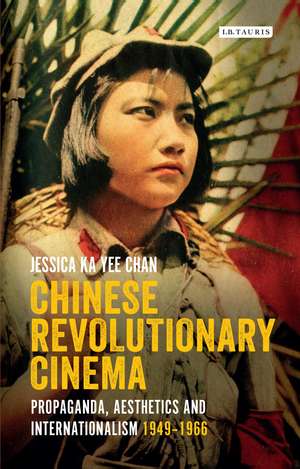Chinese Revolutionary Cinema: Propaganda, Aesthetics and Internationalism 1949–1966
Autor Jessica Ka Yee Chanen Limba Engleză Hardback – 23 ian 2019
Preț: 497.55 lei
Preț vechi: 688.58 lei
-28% Nou
Puncte Express: 746
Preț estimativ în valută:
95.20€ • 99.41$ • 78.62£
95.20€ • 99.41$ • 78.62£
Carte disponibilă
Livrare economică 25 martie-08 aprilie
Preluare comenzi: 021 569.72.76
Specificații
ISBN-13: 9781788311908
ISBN-10: 1788311906
Pagini: 288
Ilustrații: 25 b&w
Dimensiuni: 138 x 216 x 22 mm
Greutate: 0.48 kg
Editura: Bloomsbury Publishing
Colecția I.B.Tauris
Locul publicării:London, United Kingdom
ISBN-10: 1788311906
Pagini: 288
Ilustrații: 25 b&w
Dimensiuni: 138 x 216 x 22 mm
Greutate: 0.48 kg
Editura: Bloomsbury Publishing
Colecția I.B.Tauris
Locul publicării:London, United Kingdom
Notă biografică
Jessica Ka Yee Chan is Assistant Professor of Chinese Studies at the University of Richmond, USA. She has published in the East Asian Journal of Popular Culture, the Journal of Chinese Cinemas, Modern Chinese Literature and Culture, and The Opera Quarterly.
Cuprins
Introduction 11 Propaganda and Film Aesthetics 232 Literature on Screen: Recasting Classical Hollywood Narration in Family Melodrama 543 Translating Soviet Montage 874 Socialist Glamour: The Socialist Star Craze, Stanislavski's System and Cinematic Iconography of the Gaze 1195 Visions of Internationalism in Chinese Film Journals 147Conclusion 173Notes 180Glossary 215Filmography 222Bibliography 225Index 237
Recenzii
Overall, Chan's unique history provides something more than an overview of an understudied period; by examining propaganda as a complex mode that necessitated the comingling of writers, artists, performers, bureaucrats and capital ... she is able to contribute to a broader understanding of film production under socialism ... [The book] will be of interest to scholars of East Asian Cinema, Chinese Studies, as well as those with an interest in the history of socialist culture.
A long-awaited book that sheds new light on revolutionary Chinese cinema. Eloquently written, it opens our eyes not only to these films' politics, but also to their forms and artistry.
Chinese Revolutionary Cinema is based on meticulous research and insightful analysis. Avoiding Cold War rhetoric, Chan brilliantly shows how Maoist cinema interacted with Hollywood and Soviet paradigms, as it adapted melodramatic structures, montage theory, and star promotion to the revolutionary cause.
A long-awaited book that sheds new light on revolutionary Chinese cinema. Eloquently written, it opens our eyes not only to these films' politics, but also to their forms and artistry.
Chinese Revolutionary Cinema is based on meticulous research and insightful analysis. Avoiding Cold War rhetoric, Chan brilliantly shows how Maoist cinema interacted with Hollywood and Soviet paradigms, as it adapted melodramatic structures, montage theory, and star promotion to the revolutionary cause.
